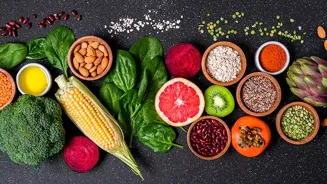Thiamine is a water-soluble vitamin that is required for your overall well-being.
Since the human body cannot produce it naturally, you have to depend solely
on your diet to meet your daily requirements. But which foods are thiamine-rich? Here’s a list.
Thiamine, or vitamin B1 as it’s called, is a major B-complex vitamin that your body needs to function properly. It breaks down the consumed food into a biochemical form called adenosine triphosphate that your body further uses as energy. It also plays a significant role in the nervous, muscular, and cardiovascular systems.
Although rare, a thiamine deficiency is associated with lots of health issues, such as fatigue, nausea, blurred vision, muscle weakness, loss of appetite, shortness of breath, and more. In this article, we will talk about some food items that may provide your body with an adequate amount of this essential vitamin.
Flax Seeds: Good for Skin/Hair
Flax seeds make for a healthy, balanced snack to munch on at any time. It is a good source of fiber, calcium, protein, carbs, healthy fats, etc.; flax seeds contain 1.6mg of it per 100-gram serving.
Brown Rice: A Healthier Alternative to White Rice
When it comes to whole-grain foods, brown rice is one of the best options for your health. It contains a high amount of fiber, sodium, calcium, potassium, phosphorus, proteins, healthy fats, and more. Also, it has 0.2mg of thiamine per 100 grams of serving.
Asparagus: Touted as a Medicinal Vegetable
Asparagus is a great source of thiamine, along with fiber, copper, potassium, protein, vitamin A, vitamin C, vitamin B6, etc. A standard-sized cup of cooked asparagus can provide your body with up to 0.19 mg of thiamine. Regular consumption of this vegetable may boost your digestive health to a great extent.

Tofu: Loaded with Disease-Fighting Effects
Tofu is mostly known as a great source of plant compounds. It also contains protein, saturated fats, carbohydrates, etc., along with lots of antioxidants. A 100-gram serving of firm tofu contains around 0.2mg of thiamine, which is 13% of your daily requirements. Several studies have shown that consuming tofu regularly is linked to a good range of health benefits.
The list also includes foods like lentils, milk, soybeans, black beans, navy beans, green peas, etc.






![[WATCH] 'Real Madrid, Ramadan and rest' - Mohammed Siraj how last-minute World Cup call-up changed February plan](https://g-mob.glance-cdn.com/public/fc/image/ByYT_LEmlrD0.webp)








